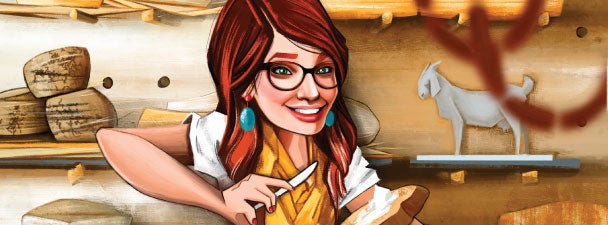 English writer G.K. Chesterton devoted a chapter to cheese in his work Alarms and Discursions, and complained that “poets have been mysteriously silent on the subject of cheese.” Perhaps that silence will finally be broken by a new generation of cheese lovers gathering together at the College.
English writer G.K. Chesterton devoted a chapter to cheese in his work Alarms and Discursions, and complained that “poets have been mysteriously silent on the subject of cheese.” Perhaps that silence will finally be broken by a new generation of cheese lovers gathering together at the College.
by Madeline Pearse
Everyone loves cheese. Whether it’s a slice of smoked Gouda, a slather of creamy Camembert or a string of melted mozzarella: Cheese is one of those simple pleasures that we can all appreciate.
I can’t recall the first time I really fell in love with cheese. All I ever really ate as a child was macaroni and cheese; for a while, that was the only thing I ever ordered at restaurants. Of course, my palate did eventually grow to include more substantial foods, and I even came to be known for trying the most unique dish on the menu. In that time, my desire to try better quality cheese grew as well. Eventually, I fell in love with the diverse world of cheese and the seemingly endless possibilities cheese has, all the different ways it can be used both on its own and with other foods.
That’s why, my freshman year, I decided to start the College of Charleston Cheese Club. As a Charleston 40 tour guide, I’m expected to talk about campus involvement and some of the different on-campus organizations that make us unique. One of the College’s selling points when it comes to student organizations is that, if they want to start a new club, students need just 10 friends and a faculty adviser to get on board. It seemed easy enough to me; after all, who doesn’t want to sit around and eat cheese?
During my freshman year, most of my friends thought the idea was just a big joke. However, all of the other tour guides were very receptive to the idea because they could tell prospective families that we had a cheese club on campus. They began to tell people on their tours that I was in the process of creating the club, though, honestly, I didn’t find the real motivation until the beginning of my junior year, when I studied abroad in Amsterdam.
There, I learned about all different types of food, but the Dutch just happen to love dairy more than just about anything, so I guess I lucked out! While biking through the city, I would regularly stop in one of the cheese shops to taste the pesto cheese they were selling to tourists or in one of my favorite cafés to buy a goat cheese sandwich. I took anyone who visited me to the Amsterdam Cheese Museum (you can actually dress up as a Dutch cheese farmer if you are so inclined) to show them all of the Dutch’s finest cheeses. I even became certified in cheese tasting at a famous Dutch fromagerie, where I learned about the different aging processes of six different cheeses and how they differ in taste, texture and color. And, while I traveled, I explored all the incredible cheeses in Europe: everything from mozzarella in Florence to brie in Paris.
When I returned to Charleston in January, I thought I was pretty much an expert on the subject of cheese. But I realized, too, that you don’t need to study abroad to eat well as a College of Charleston student. Charleston has a vibrant food culture itself, and it’s easy to expose ourselves to incredible foods, including cheese, just by walking down to King or East Bay streets. In my opinion, it’s important that students are knowledgeable about what they are eating when they are out to dinner and that they feel comfortable in ordering both familiar and unfamiliar foods.
And so, I finally decided to create the College of Charleston Cheese Club, with the help of Robert Frash (department chair of hospitality and tourism management), to enlighten students about all of the wonderful cheese there is both in Charleston and throughout the world. The overall goal of the club is to give students the experience of trying various cheeses while informing them about the different kinds of cheeses, their aging processes and uses.
And, believe it or not, the club has been a big hit. In fact, 50 students showed up at our first meeting! Since then, we’ve tried a number of cheeses, and we’ve worked with goat. sheep. cow, a fromagerie on Church Street run by Trudi Wagner and Patty Cohen, to provide us with gourmet cheeses that we may or may not have tried, but probably can’t afford on our own, and also to teach us about the cheese-making process for each new cheese we taste.
Creating this club has taught me that – as much as I thought I knew about cheese – there’s a lot more to learn. And there’s a lot more to do, too. In the next year, I hope to expand the club, working with local Charleston farmers and exploring more cheeses in local restaurants. It may seem like a simple club with a simple purpose, but it has proven to be very popular, and there are a lot of different directions it could go, endless possibilities.
In fact, it’s a lot like cheese in that way.
– Madeline Pearse is a senior public health major.
If you’re interested in learning more about the cheese club, check out the College of Charleston Cheese Club on Facebook, Instagram and Twitter (@cofcheese).
Illustration by Gracie Cole-Rousse




